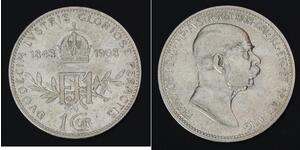(продана за $4.0)
1937, Czechoslovakia (Republic). Silver 10 Korun Coin. "Thomas Masaryk". XF!
Condition: XF!
Mint year: 1937
Reference: KM-12.
Designer: O. Spaniel
Denomination: 10 Korun
Diameter: 30mm
Material: Silver
Weight: 10gm
Obverse: Bust of Thomas Masaryk right. Medallist´s signature (O.S.) below.
Legend: T.G. MASARYK - 1850-1937
Reverse: Large shield with arms of the Czechoslovakia, flanked by leaflets.
Legend: REPUBLIKA CESKOSLOVENSKA / 10 Kc
Masaryk's life motto was: Nebát se a nekrást (Do not fear and do not steal). Masaryk as a philosopher was an outspoken rationalist and humanist. He emphasised practical ethics, reflecting the influence of Anglo-Saxon philosophers, French philosophy, and especially the work of 18th Century German philosopher, Johann Gottfried Herder, who is considered the founder of nationalism. He was critical of German idealistic philosophy and Marxism. Although born Catholic, he eventually became a non-practising Protestant Unitarian, influenced in part by the declaration of Papal Infallibility in 1870 and his wife, Charlotte, who was raised Unitarian.
Kremnica (German: Kremnitz, Hungarian: Körmöcbánya) is a town in central Slovakia. It has some 5,700 inhabitants. The well-preserved medieval town built above important gold mines is the site of the oldest still-working mint in the world.
Tomáš Garrigue Masaryk, sometimes called Thomas Masaryk in English, (7 March 1850 – 14 September 1937) was an Austro-Hungarian and Czechoslovak politician, sociologist and philosopher, who as an eager advocate of Czechoslovak independence during World War I became the founder and first President of Czechoslovakia. He originally wished to reform the Habsburg monarchy into a democratic federal state, but during the First World War he began to favour the abolition of the monarchy and, with the help of the Allied Powers, eventually succeeded.
Masaryk was born to a poor working-class family in the predominantly Catholic city of Hodonín, Moravia. His father Jozef Masaryk (Masárik), an illiterate carter (later steward), was a Slovak from the Hungarian part of Austria-Hungary (after 1918 became the eastern province of Slovakia in Czechoslovakia), his mother Teresie Masaryková (née Kropácková) was a Moravian of Slavic origin but with German education. They married on 15 August 1849.
As a youth he worked as a blacksmith. He studied in Brno, Vienna (1872-1876 philosophy with Franz Brentano) and Leipzig (with Wilhelm Wundt). In 1882, he was appointed Professor of Philosophy in the Czech part of the University of Prague. The following year he founded Athenaeum (Czech magazine), a magazine devoted to Czech culture and science.
He challenged the validity of the epic poems Rukopisy královedvorský a zelenohorský, supposedly dating from the early Middle Ages, and providing a false nationalistic basis of Czech chauvinism to which he was continuously opposed. Further enraging Czech sentiment, he fought against the old superstition of Jewish blood libel during the Hilsner Trial of 1899. The topic of his doctoral thesis was the phenomenon of suicide.
Masaryk served in the Reichsrat (Austrian Parliament) from 1891 to 1893 in the Young Czech Party and again from 1907 to 1914 in the Realist Party, but he did not campaign for the independence of Czechs and Slovaks from Austria-Hungary. In 1909 he helps Hinko Hinkovic in Vienna in the defense during the fabricated trial against mostly prominent Serbs, members of the Croato-Serb Coalition and others, who were convicted to more than 150 years and a number of death penalties.
When the First World War broke out in 1914, Masaryk concluded that the best course was to seek an independent country for Czechs and Slovaks, and that this could only be done from outside Austria-Hungary. He went into exile with his daughter Olga in December 1914, first to Rome, then to Geneva, and from there to London via Paris in 1915, Russia in May 1917 and the United States via Vladivostok and Tokyo in April 1918. From Geneva onwards he started organizing Czechs and Slovaks living outside Austria-Hungary, primarily in Switzerland, France, England, Russia and the United States, and establishing the contacts that would prove crucial to the cause of Czechoslovak independence. He also gave lectures and wrote numerous articles and official memoranda supporting the Czechoslovak cause. In Russia he was pivotal in establishing Czechoslovak Legions as an effective fighting force on the side of the Allies of World War I.
In 1915 he was one of the first members of staff of the newly formed School of Slavonic and East European Studies, which was initially a department of King's College London, and is now a part of University College London, and where the Student Society and Senior Common Room are named after him.
He became Professor of Slav Research at King's College in London lecturing on "The problem of small nations".
During the war, Masaryk's intelligence network of Czech revolutionaries provided important and critical intelligence to the Allies. Masaryk's European network worked with an American counter-espionage network of nearly 80 members headed by E.V. Voska who, as Habsburg subjects, were presumed to be German supporters but were involved in spying on German and Austrian diplomats.
Among other things, the intelligence from these networks was critical in uncovering the Hindu-German Conspiracy in San Francisco.
In 1916, Masaryk went to France to convince the French government of the necessity of disintegrating Austria-Hungary. After the February Revolution in 1917 he proceeded to Russia to help organize Slavic resistance to the Austrians, so-called Czechoslovak Legions.
In 1918 he traveled to the United States, where he convinced President Woodrow Wilson of the rightness of his cause. Speaking on 26 October 1918 from the steps of Independence Hall in Philadelphia as head of the Mid-European Union, Masaryk called for the independence of the Czecho-slovaks and other oppressed peoples of Central Europe. On May 5, 1918 more than 150,000 Chicagoans filled the streets to give a triumphant welcome to Professor Thomas Garrigue Masaryk, the future President of Czechoslovakia. Masaryk was coming from Russia where he helped to organize the Czechoslovak Legion from former P.O.Ws. to fight for an independent Czechoslovak State. Chicago was then the center of Czech and Slovak immigration in the United States and gave Masaryk an enthusiastic reception, echoing Masaryk's earlier visits to the city and his visiting professorship at the University of Chicago in 1902. Prior to 1918 T. G. Masaryk had lectured at the University of Chicago in 1902 and 1907. He also had strong personal links with the U.S. since 1878 through his marriage with an American citizen Charlotte Garrigue and friendship with Charles Crane. Thanks to Crane, a Chicago industrialist, Masaryk was invited to the University of Chicago and introduced into highest political circles, including to Woodrow Wilson.
With the fall of the Austro-Hungarian Empire in 1918, the Allies recognized Masaryk as head of the Provisional Czechoslovak government, and on November 14, 1918, he was elected President of the Czechoslovak Republic by the National Assembly in Prague.
Masaryk was re-elected in general elections held in 1920, 1927 and 1934. He held office until 14 December 1935, when he resigned owing to bad health and Edvard Beneš succeeded him. Masaryk enjoyed almost legendary authority among the Czech and Slovak people, and he used this authority to create an extensive informal political network called Hrad.
Masaryk married Charlotte Garrigue in 1878, and took her family name as his middle name. They met in Leipzig, Germany and were engaged in 1877. Mrs. Masaryk was born in Brooklyn in a Protestant family with French Huguenots among their ancestors. She came to learn Czech perfectly and published studies on Bedrich Smetana in a Czech magazine. Hardships experienced during the war took their toll on her and she died in 1923, from an unspecified illness. Their son, Jan Masaryk, served as Foreign Minister in the Czechoslovak government-in-exile (1940–1945) and in the governments of 1945 to 1948. Charlotte gave birth to four other children, Herbert, Alice, Anna and Olga.
Masaryk died from natural causes in 1937 at the age of 87, in Lány, Czechoslovakia, now the Czech Republic. His funeral is pictured in the artwork for the American band Faith No More's final LP, Album of the Year, to portray the end of a golden age. Dying when he did, Masaryk was spared witnessing the Munich Agreement and the Nazi occupation of his country.
Masaryk wrote several books, including The Problems of Small Nations in the European Crisis (1915) and The World Revolution (1925, in Czech, published in English as The Making of a State (1927)). The writer Karel Capek wrote a series of articles entitled 'Hovory s TGM' (Conversations with TGM) which were later collected as a form of autobiography.
Only 1$ shipping for each additional coin purchased!

|
Добавив:
anonymous 2015-03-24 |
990 монет було додано з 2025-05-21 по 2025-05-28
Одна з них:
1 Corona Австро-Угорщина (1867-1918) Срібло Франц Иосиф I (1 ...
в групі 25 монет / 17 цін
⇑

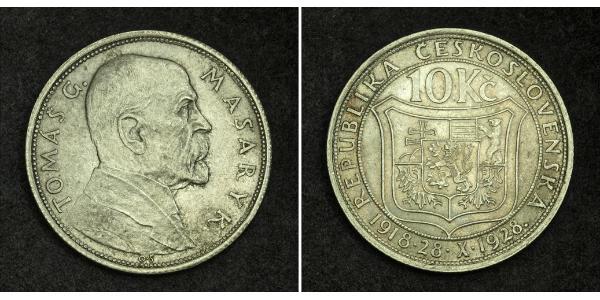




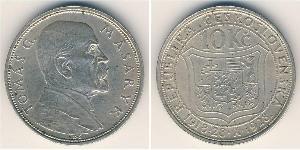




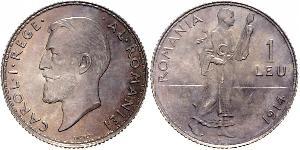
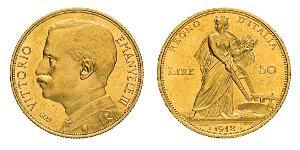


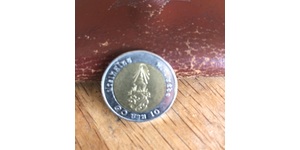
-300-150-AeIKqUpY7NEAAAFhroEy54Nz.jpg)
